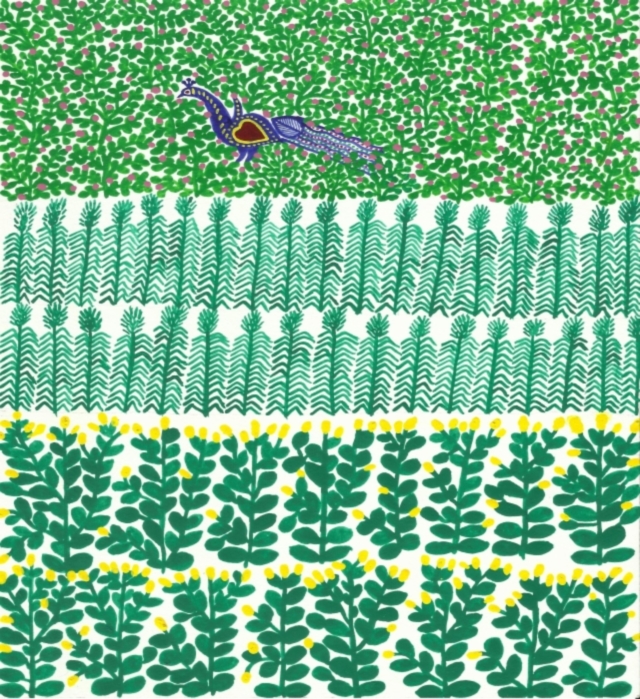Freedom, we couldn’t write your name: Aruni Kashyap

Art: Sunita
1966
Shopping : A Letter
Instead of those slippers, scattered
like dry leaves in your courtyard after a windy day
I had expected to see
Bhutiyas with colourful sweaters. Though
it was late January, it was still the season
when you wanted to stay longer in bed, under
the warmth of a quilt. The night before, I had
to push my husband away from the fire that he had lit
in an old black iron cauldron that didn’t have a handle
on one side. I told him to go sleep, because I was ready,
my hands cold, wrinkled after washing the dishes;
because we would have to start early tomorrow, catch the bus, grab a
seat before they were filled up with dirty men and women
who went to sell ducks and vegetables in the city,
who didn’t mind waking up early,
who went to bed early despite warm crackling fires.
The cold would stay on
for a few more weeks, if not a month, I had
told him. So we would have
to look out for Bhutiyas, though we were actually
making the trip to buy golden silk for
next month’s wedding.
But I didn’t see what I had expected to see
as soon as we had stepped onto the main street of the market. Instead of the children
who should have been roaming around with tiny national
flags tucked in their shirt pockets, instead of the people
going for the parade in Judge’s Field,
I only saw people running. A group of
bearded, clean-shaven young boys came sprinting, shouting,
asking people to shut shop. We ducked when stones were thrown,
and my husband said, something must have happened during
the parade. We took shelter in a small lane, but I was
eager to move because I knew if something happened there,
no one would hear even if I screamed
at the top of my voice and he would have to see
me lose everything. But
I didn’t know
who would come for rescue,
who would take away everything that I had
though I knew it wouldn’t be the ornaments
or the money only.
Pressed against the brick wall like children playing hide and seek, I
heard the sounds of my heart replicating the sounds of
feet running around. People screamed. Shops shut down,
rattling. When we walked out, seeing policemen who
looked reassuring, I saw hundreds of slippers strewn. They should
leave our state, the officer told us. This is the den of
those parasites that suck our blood, my husband’s elder sister’s
husband told my husband, while she shook her head, agreeing. Later,
she showed me the posters she had made, staying up all night
along with her son, his friends, her husband, her husband’s friends. I
didn’t ask her where would they go,
why couldn’t our people set up business, do better
what was the need to terrorize people
who were working harder than us –
we who loved to sleep till late. Who loved to
work less, earn more, eat well.
We who were reluctant to move out
of the state in search of jobs. I was
a newlywed bride, propriety gagged me, just
the way conscience was gagged by emotions in
the subsequent years.
2012
Freedom
Freedom, we are still waiting
to paint your name on the hand looms
that weave red flowers into cream-white silk;
on the emerald meadows, sprawled
dreamily in the blue sky’s embrace.
Freedom, we are still waiting for that ship
to arrive with your name inscribed on its mast.
We still believe your name will be
painted in cheerful blue on its sails
which will flutter in the air
like the hair of a village girl
in February – when red flowers bloom
like mischievous ideas in a child’s mind.
Freedom, we couldn’t write your name
on banana-leaves with blue fountain pens,
on grains of white rice with needle-points,
on the echo of our childhoods,
on the fine surface of rice husk,
on the transparent wings of dragonflies,
on their pink-blue-green tails.
Women couldn’t melt you, shape you, stud you with gems
to hang from their soft earlobes; men
couldn’t wrap you in strips of newsprint,
like tobacco, light one end, take a drag,
reclining dreamily against tree-trunks
on summer noons. Children couldn’t
peel you like ripe mangoes. No, you couldn’t
even be the walking-stick of grey-haired ones or
a drop of water on their tongue before
the final breath.
We couldn’t usher you in.
We couldn’t make
you sit on wooden dining tables, serve you
an elaborate meal though we waited for long
with our doors ajar, clothes washed,
verandas mopped with fragrant water,
or with cow-dung blended with white soil
brought from the riverbanks.
But here, on the wide banks of the Brahmaputra,
you were defined everywhere:
on the ruddy rivers,
where instead of fishes
chopped limbs stuck in the nets of fishermen.
Where fingers with and without nails were
scooped up by a woman who went to wash dishes
in the stream that ran beside her house.
Often freedom was written
between the legs of women
left bleeding; on the penises of men
who only spewed white froth
from their mouths, not information.
Freedom: we are still waiting
for your arrival. Until then
you will be performed
and explained, because ancient stories
tell us: definitions have always
belonged to the definers.
(In response to Paul Eluard’s ‘Liberty’ and Birinchi Bhattacharya’s ‘Swadhinota’)
profound!